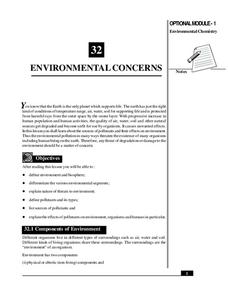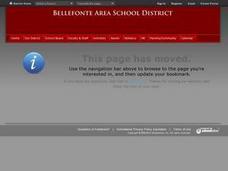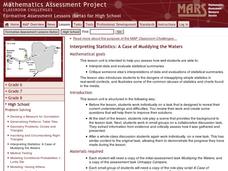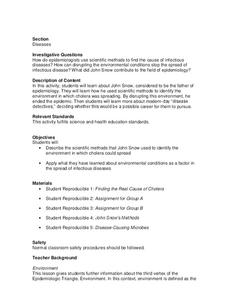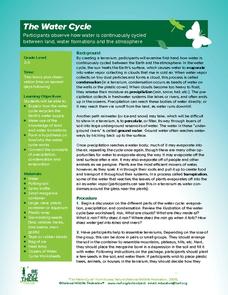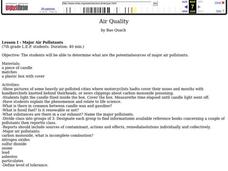Alabama Learning Exchange
Make a Difference!
We are very dependent upon other life forms around us to survive. Here, scholars explore relationships in the ecosystem with the help of Auntie Litter and the pollution patrol. They imagine a world without grass, making connections to...
Curated OER
Liquid Assets: Watershed
Students watch videos and create a representation of their watershed. In this water resources and pollution instructional activity, students watch three short videos and discuss them. They use ordinary objects to create a model of their...
National Institute of Open Schooling
Environmental Concerns
Every year, more than 14 billion pounds of garbage is dumped into the oceans of the world, most of which is plastic and toxic to ocean life. Lesson 32 in the series of 36 focuses on environmental concerns, specifically pollution. Under...
US Environmental Protection Agency
A Mock Town Meeting on a Proposed Tank Farm
Intended as a follow up to the Protecting Your Drinking Water activity, young environmentalists use their assessment of the a hypothetical town's water supply to debate the installation of underground chemical storage tanks. With the...
Sargent Art
Protect Our Marine Life
Encourage water conservation and boost art skills with a hands-on activity that challenges young painters to create a scene highlighting marine life. Using oil pastels, scholars draw an underwater scene and write a tip for viewers to...
Curated OER
Pollution Search
First graders identify forms of pollution and describe effects that various pollutants can have on people, wildlife, and plants; students describe relationships between various forms of pollution and human actions.
Safe Drinking Water Foundation
Ask an Engineer
A wrap-up to the unit, young environmentalists discuss and write about the difference in perspectives of a water keeper and water treatment engineer.
Curated OER
Interpreting Statistics: A Case of Muddying the Waters
Is river pollution affecting the number of visitors to Riverside Center, and is the factory built upstream the cause of the pollution? Let your class be the judge, literally, as they weigh the statistical evidence offered by the factory...
Curated OER
Digital Video Lesson Plan: Brine Shrimp
Middle schoolers participate in classroom experiment to gain better understanding of type of environment brine shrimp can best survive. Students then explore effects of common saltwater pollutants on survival of animals in sea.
Core Knowledge Foundation
Taking Care of the Earth Tell It Again!™ Read-Aloud Anthology
A read-aloud anthology closely examines human impact on the Earth while boosting reading comprehension skills. Through stories, scholars examine the concepts of natural resources, pollution, garbage, and recycling and brainstorm ways to...
Curated OER
The Air We Have Around Us
Students listen to story, The Lorax, by Dr. Seuss, discuss air quality and how people affect the earth and its atmospheric cycles, and give oral reports on what they have learned.
Curated OER
Chemical Consequences of Burning Fossil Fuels
Future scientists are introduced to the chemical consequences of burning fossil fuels, learning that fossil fuel combustion leads to the formation of oxides of three nonmetals: carbon, nitrogen, and sulfur, all of which end up in the...
NOAA
Biological Oceanographic Investigations – Keep Away
As of 2015, there are 53,481 oil wells in the Gulf of Mexico. Scholars determine how species diversity is impacted based on the ecosystem's distance from a drilling platform. It focuses on finding the mean of data sets and creating bar...
Centers for Disease Control and Prevention
Diseases
During a cholera outbreak, scientists presented two theories; one theory was based on miasma and the other on germs and contaminated water. The lesson looks at the scientific process for finding the real culprit.
Safe Drinking Water Foundation
I Want to Be an Engineer
Environmentalists turn into engineers! Your class explores the perspectives of an engineer and water keeper, including the necessary steps that are taken in order to build a water treatment facility.
Redefining Progress
Have and Have-Not
Is there a correlation between a country's wealth and the extent of its ecological footprint? What exactly constitutes an ecological footprint, and how does one country stack up against the rest? This is a unique lesson to incorporate...
Curated OER
Salt Marsh in a Pan
Students create a model of a salt marsh to discover the impact of pollution and human activities on water-based habitats including bays and the ocean. They recognize the relationship between natural and developed areas. Students impact...
Curated OER
Clean Water vs. Dirty Water
Students study the importance of clean water to the survival of organisms and what activiities and material pollute water. They measure the temperature of water samples and create a class graph.
Curated OER
The Water Cycle
Students are introduced to the components and importance of the water cycle. They are shown how groundwater moves using a model. Students list 9 places on earth where water is found. They define the terms cycle and water cycle.
NOAA
Seafood and Human Health
Whether your young biologists realize it or not, humans play a significant role in marine ecosystems. To help them understand this fact children first create graphical representations that show homo sapiens' place in marine food chains,...
Curated OER
Air Quality
Students determine potential sources of major air pollutants, explain how acid rain is generated and how it affects the environment, discuss global warming, and explore protective role of ozone and cause of ozone layer thinning. Lessons...
Curated OER
Is Our Water Clean?
Students identify qualities of clean water which will develop an awareness of people in the community who keep our water clean. This lesson has a literature tie-in with the "Magic School Bus" series.
Curated OER
Language Arts: Investigating Issues That Matter
Pupils are able to become more informed about the dangers of water contamination by sharing their prior knowledge with each other. They discover the importance of communicating these dangers to the public.
NOAA
Stressed Out!
Are our oceans really suffering due to the choices humans make? The sixth and final installment in the volume of activities challenges research groups to tackle one of six major topics that impact ocean health. After getting to the...




